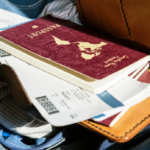The EU Blue Card is a highly sought-after residence permit for skilled non-EU professionals looking to work in Germany and other EU member states. For Saudi Arabian nationals, the Blue Card offers a pathway to work and live in Germany with several key benefits, including a streamlined process for family reunification and access to permanent residency. This guide details the requirements for Saudi Arabian nationals applying for the Germany Blue Card, eligibility criteria, required documents, and application steps.
What is the EU Blue Card?
The EU Blue Card is a residence permit designed for highly skilled professionals from non-EU countries. The purpose of the Blue Card is to attract talent from outside the EU in fields where there is a shortage of skilled workers, such as IT, engineering, healthcare, and scientific research. It enables professionals to live and work in Germany with attractive benefits like fast-tracked permanent residency and family reunification options.
Key Benefits of the EU Blue Card
- High Mobility Across the EU: After 18 months, cardholders can move to other EU countries and apply for their Blue Card there.
- Permanent Residency: Eligible for permanent residency in Germany after 33 months, or 21 months with sufficient German language proficiency.
- Family Reunification: Spouses and children can join Blue Card holders in Germany, with spouses granted immediate access to the labor market.
- Access to Social Benefits: Cardholders can access healthcare, social security, and other benefits in Germany.
Eligibility Criteria for Saudi Arabian Nationals
To apply for the Germany Blue Card, Saudi Arabian professionals must meet specific requirements related to employment, education, and salary.
1. Recognized University Degree
- Academic Qualification: Applicants must hold a university degree recognized in Germany. Degrees obtained outside of Germany must be either equivalent to German qualifications or recognized by the German government.
- Degree Equivalency Check: Verify your degree’s equivalency using the ANABIN database, Germany’s official qualification recognition platform.
2. Employment Offer in Germany
- Job Offer Requirement: A valid job offer or employment contract from a German employer is essential for Blue Card eligibility. The position must be related to the applicant’s field of expertise.
- Skill Level Requirement: The job should match the level of skills acquired in the applicant’s education, typically in fields requiring advanced technical or specialized knowledge.
3. Minimum Salary Threshold
- Salary Requirement: The EU Blue Card has a minimum salary threshold that varies by occupation and region within Germany. As of 2024:
- General Occupations: Minimum annual gross salary of €58,400.
- Shortage Occupations (e.g., IT, engineering, medicine): Minimum annual gross salary of €45,552.
These thresholds are updated annually, so applicants should verify the latest salary requirements on the German Federal Government website.
4. Health and Legal Requirements
- Health Insurance: Applicants must have health insurance coverage, either through a German provider or a recognized international provider.
- Clean Legal Record: A police clearance certificate from Saudi Arabia or previous residence countries may be requested during the application process.
Step-by-Step Process to Apply for the Germany Blue Card
Saudi Arabian nationals can apply for the EU Blue Card either from within Germany (if they are already residing legally) or from their home country through the German embassy. Below is the detailed application process:
Step 1: Confirm Eligibility and Job Offer
- Validate Degree: Use the ANABIN database to confirm that your degree meets German standards.
- Obtain a Job Offer: Secure an employment contract from a German employer, ensuring the position meets the minimum salary threshold.
Step 2: Prepare the Necessary Documents
Gather the required documents for your Blue Card application. These typically include:
- Valid passport
- University degree and, if applicable, its ANABIN equivalency confirmation
- Employment contract or job offer letter detailing salary and job description
- Proof of health insurance coverage
- Passport-sized photographs (per German biometric standards)
- Police clearance certificate (if required)
Step 3: Schedule a Visa Appointment at the German Embassy
- Apply for National D Visa: Saudi Arabian nationals need a National D Visa to enter Germany for employment. Schedule an appointment at the German Embassy in Saudi Arabia to submit your application.
- Prepare for Interview: Be ready to explain your job role, salary, and intentions in Germany during the appointment.
Step 4: Submit Blue Card Application in Germany
Once in Germany, you’ll need to apply for the Blue Card at the local Foreigners’ Office (Ausländerbehörde).
- Register Your Residence: Upon arrival, register at the local town hall within two weeks.
- Attend Foreigners’ Office Appointment: Submit your Blue Card application, along with required documents, proof of salary, and health insurance. You may also be asked for biometric data (fingerprints and photo).
- Receive Decision: Processing times vary but generally take around 4-6 weeks. If approved, you will receive the Blue Card, valid for up to four years (or the length of your employment contract plus three months).
Additional Information for Blue Card Holders
Language Requirements for Permanent Residency
Blue Card holders can apply for permanent residency after:
- 33 months without German language proficiency, or
- 21 months with B1-level German language skills.
Family Reunification and Work Rights for Spouses
Family members of Blue Card holders are eligible for residence permits and can immediately work in Germany without additional permits. Children under 16 automatically receive residence permits, while those 16 and above may require proof of German language skills.
Blue Card Renewal and Mobility Within the EU
The Blue Card can be renewed if employment continues to meet eligibility requirements. After 18 months, Blue Card holders may apply to work in another EU country under the Blue Card scheme, offering greater career flexibility within Europe.
Frequently Asked Questions (FAQ)
1. Can Saudi Arabian nationals with the Blue Card access Germany’s healthcare system?
Yes, Blue Card holders must have health insurance, which grants access to Germany’s healthcare system, including both public and private healthcare options.
2. What if my salary falls below the Blue Card threshold?
If your salary does not meet the Blue Card minimum, consider applying for a different work visa, such as the German Work Visa, which has different requirements but does not offer the same benefits as the Blue Card.
3. Is it possible to switch jobs with a Blue Card?
Yes, but any new job must meet the Blue Card eligibility criteria. You’ll need to inform the local Foreigners’ Office about the job change, and your Blue Card may be updated to reflect the new employment details.
Conclusion
The Germany EU Blue Card is an excellent opportunity for skilled Saudi Arabian professionals to work and build a life in Germany. By understanding the specific eligibility requirements—such as recognized qualifications, minimum salary, and health insurance—applicants can better navigate the application process and prepare for a successful transition. With its numerous advantages, including a pathway to permanent residency and family benefits, the Blue Card remains a top choice for Saudi Arabian nationals seeking to advance their careers in Germany.













